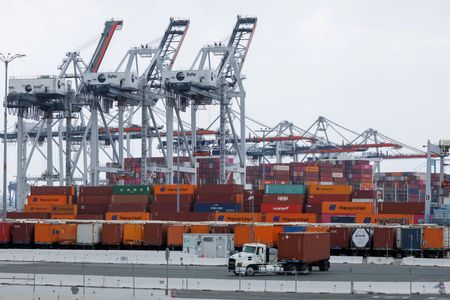By Joseph White
DETROIT (Reuters) -Nissan Motor Co said on Thursday it will invest $500 million to retool its U.S. assembly plant near Canton, Mississippi, to build two new electric vehicles, and a top executive said the automaker is looking for a U.S. site to build a battery factory.
Nissan said it plans to assemble electric vehicles for its Nissan and Infiniti brands in Mississippi starting in 2025. The automaker said it aims to have electric vehicles make up 40% of its U.S. sales by 2030. Nissan has outlined plans to invest $18 billion to expand its global electric vehicle fleet through 2030.
“We are investigating the right location and the right timing” to build the U.S. battery factory, Nissan Chief Operating Officer Ashwani Gupta said in an interview. “It should be soon.”
Nissan operates two assembly lines in Canton, one building light trucks including the Nissan Frontier and the other assembling Altima mid-sized sedans.
Gupta said the Altima assembly line will be redesigned to build both electric and combustion vehicles. Additional space in the Canton factory will be repurposed for battery pack assembly and other operations as Nissan aims for more vertical integration.
The 19-year-old Canton complex employs 5,000 people. Nissan said it will retrain 2,000 workers as part of the new investment.
The proposed models will have new lightweight architectures designed for battery-electric powertrains, and autonomous driving technology, Gupta said.
“A significant amount of time and money (will be) spent on upskilling the workforce,” he said.
The automaker said the investment in Mississippi is “one of several” planned over the next five years to expand electric vehicle production in the United States.
Nissan’s Mexican operations should also receive new investment related to electric vehicles, Gupta said. “Obviously, Mexico will be a part of it.”
Nissan is investing as it sees markets becoming ready for electric vehicles, he said. “We are not going for a big bang.”
Nissan has outlined plans to deliver 23 new electrified vehicles globally by 2030, including 15 battery electric models.
Nissan builds its compact Leaf electric vehicle at its complex in Smyrna, Tennessee, which gets electric motors from a Nissan factory in Decherd, Tennessee.
The Leaf, launched in 2010, put Nissan in the forefront of established auto manufacturers in the emerging electric vehicle market. But the Leaf, with 226 miles (364 km) of range, has been eclipsed in sales by Tesla’s Model 3 sedan which has 358 miles of driving range per charge, according to the U.S. Environmental Protection Agency.
(Reporting by Joe White; Editing by Stephen Coates and Richard Chang)











